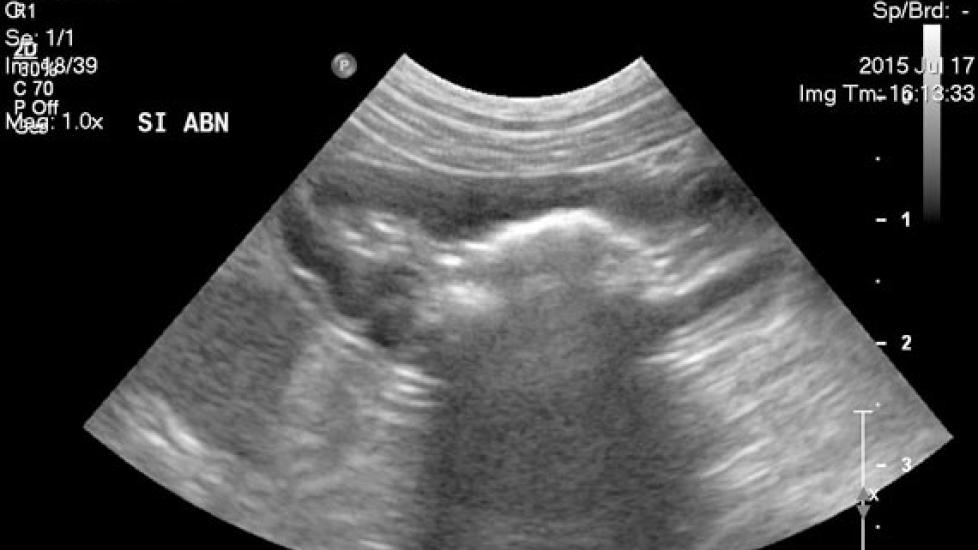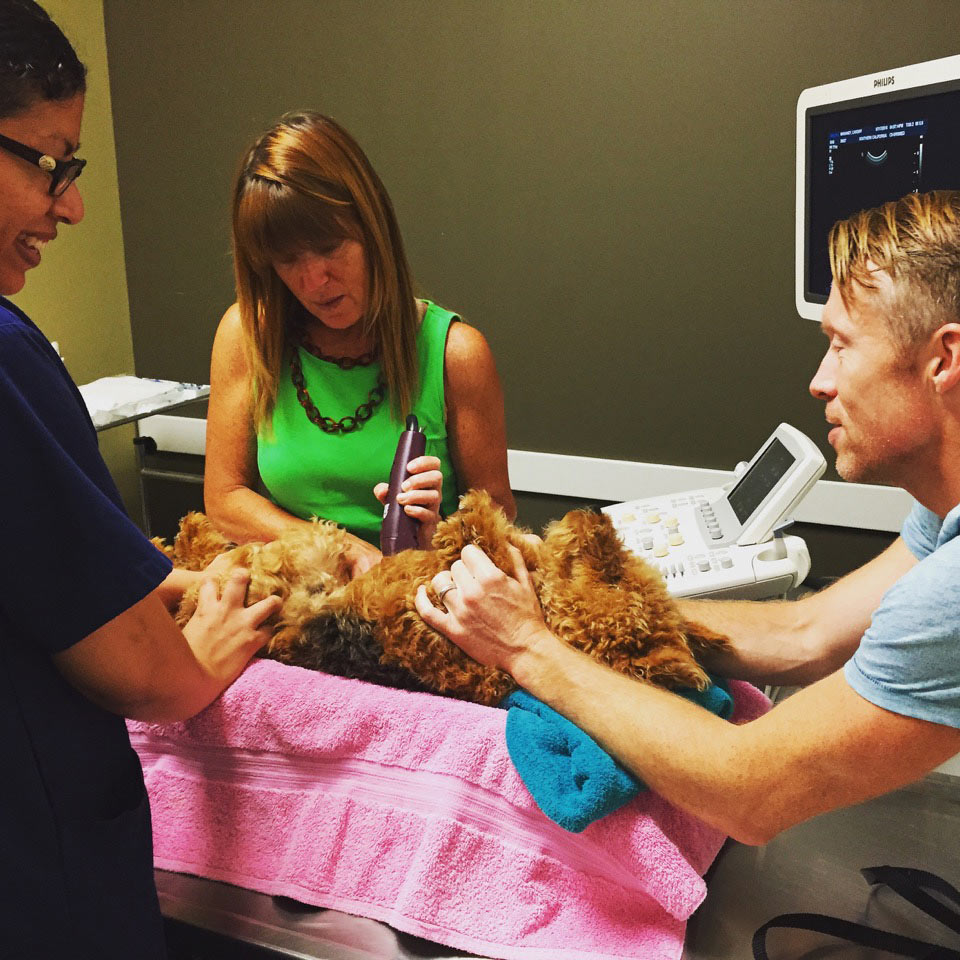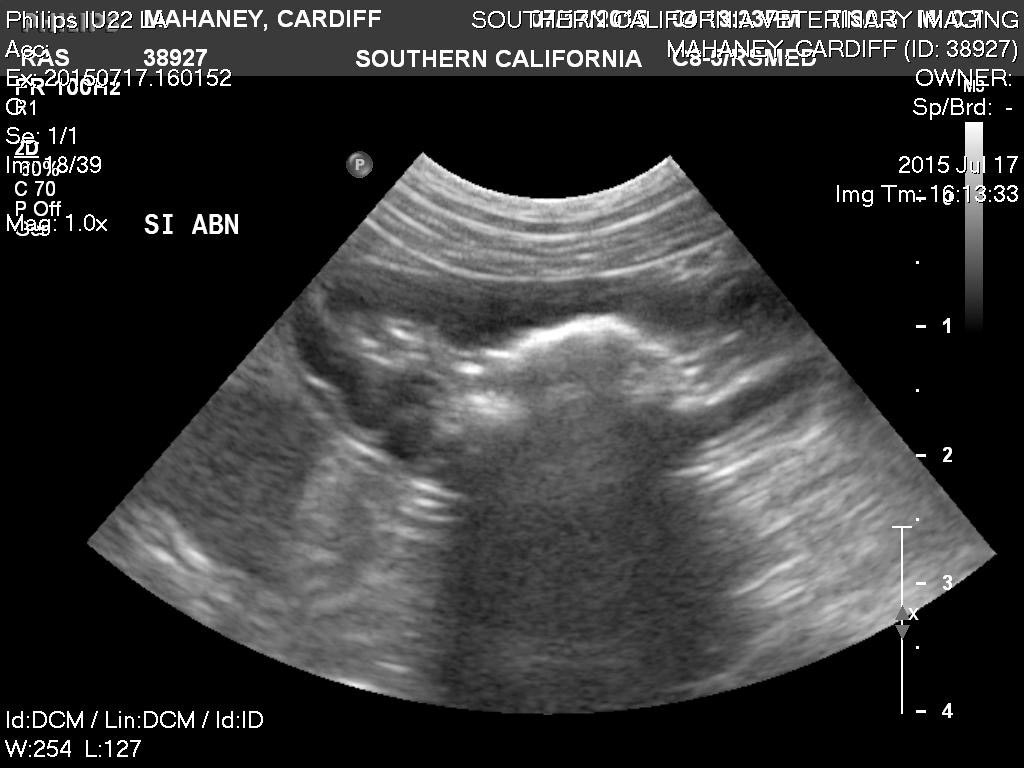What Are the Signs of Cancer Reoccurence in a Dog, and How is it Confirmed?
Although I strongly suspected Cardiff was having a recurrence of cancer (When Cancer That Was Successfully Treated Reoccurs in a Dog), I still had to take the appropriate diagnostic steps to rule out other disease.
Although he has a history of T-Cell Lymphoma manifesting as a tumor on a loop of small intestine, the fact that Cardiff is showing similar clinical signs doesn't necessarily mean he has a recurrence of cancer. Unfortunately for both owners and the veterinarians overseeing their patients’ care, the clinical signs of cancer affecting the intestines are similar to a variety of other ailments of the digestive tract, including:
- Appetite changes — Anorexia (no appetite) or hyporexia (decreased appetite)
- Vomit — Active abdominal contraction to expel stomach contents
- Regurgitation — Passive evacuation of stomach contents (appears similar to vomit)
- Diarrhea — Some combination of soft or liquid stools, changes in bowel movement patterns, mucus, blood, flatulence, etc.
- Lethargy — Having less energy for day-to-day activities
The first clinical signs that Cardiff showed related to his lower digestive tract (aka the colon or large intestine) included abnormal patterns of defecation, soft to liquid stool, and the presence of mucus. Such signs are consistent with colitis or large bowel diarrhea and have wide variety of causes, including:
- Intestinal parasites — Giardia, coccidia, roundworm, hookworm, whipworm, etc.
- Pathogenic bacterial infection — Salmonella, E. coli, Listeria, etc.
- Overgrowth of normal digestive tract bacteria — Clostridia, etc.
- Dietary indiscretion — eating something a dog should not
- Other
When Cardiff first develop signs of colitis, I immediately collected a stool sample for parasite testing and started him on an additional digestive tract-supporting supplement (Honest Kitchen Pro Bloom) in addition to his daily probiotic (Rx Vitamins for Pets Nutrigest).
When his fecal testing showed no evidence of parasites, I started treatment with an oral antibiotic called Metronidazole (Flagyl). Metronidazole is multifactorial in its properties to help digestive tract problems, as it kills many pathogenic bacteria, can deter growth of over-growing normal bacteria, and can have an anti-parasite effect for Giardia. Additionally, Metronidazole also has an anti-inflammatory effect on the intestines, so it’s commonly used for conditions like inflammatory bowel disease (IBD).
When the cocktail of Metronidazole and additional probiotic/digestive-tract supporting supplements didn't resolve his clinical signs, my next step was to perform baseline blood testing to determine if there were more serious issues affecting his liver, kidneys, pancreas, blood proteins, red and white blood cells, and other organ systems.
Cardiff’s results showed anemia with a slightly low red blood cell (RBC) count and a slightly low hematocrit (HCT, the percentage of blood made up of red blood cells). Additionally, Cardiff had a mild reduction in his total protein (TP) and Albumin (ALB).
Albumin is an important type of protein that helps to maintain blood pressure, is responsible for approximately 50% of calcium transport around the body, and aids in many cellular functions. Loss of Albumin can occur secondary to bleeding with inflammation in the intestines, which occurs with inflammatory bowel disease (IBD), or through the kidneys with protein losing nephropathy (PLN), or other.
Cardiff’s blood testing results were most consistent with blood loss due to the combination of low RBC, HCT, ALB, and TP. His anemia appears different from the four times he's had an IMHA episode, as there were no signs of RBC destruction evidenced by the release of bilirubin into the circulating blood volume. So, my differential diagnoses were pairing down to be:
- Gastrointestinal ulceration — Yet, Cardiff was not taking any medications or supplements known to cause stomach or intestinal ulceration
- Cancer — Recurrence of Lymphoma or other
- Foreign body ingestion/obstruction — Something Cardiff could have eaten could be causing serious irritation or be stuck his stomach or intestine
- Other
As a stomach or intestinal cancer can cause bleeding into the digestive tract and protein loss, I felt the highest differential was a recurrence of intestinal Lymphoma. In addition to Metronidazole and probiotics, Cardiff was started on gastrointestinal-protecting medications including:
- Famotidine (Pepcid) — An antacid injection (when vomiting) or oral treatment
- Carafate (sucralfate) — A stomach coating agent given as a slurry (tablet dissolved in liquid)
- Subcutaneous fluids — fluids under the skin, which keeps all body tissues hydrated, replace lost electrolytes, and facilitate excretion of toxic substances
- Vitamin B 12 (cyanocobalamin) — a water-soluble vitamin that is crucial for normal immune system and gastrointestinal function and the absorption of nutrients
The good news is that with this treatment Cardiff quickly improved. He felt better, showed improved appetite, and had formed stools that lacked mucus. After continuing with this course of treatment for 48 hours, his blood testing showed normal RBC, HCT, ALB, and TP.
I was hoping that we were in the clear from this latest health scare and even cancelled a follow up abdominal ultrasound with Southern California Veterinary Imaging (SCVI). But less than 24 hours later Cardiff started vomiting again despite having a good appetite. At this point I strongly suspected that something was causing a partial obstruction of his stomach or small intestine. I rebooked his ultrasound appointment and we proceeded with the imaging.
The abdominal ultrasound showed another mass-like lesion on his small intestine which was creating a partial obstruction so that food and fluid couldn't move through as well. Additionally, there was an enlarged lymph node adjacent to the site of concern. Therefore, the most likely cause of Cardiff’s illness was a recurrence of Lymphoma.
Fortunately, chest and abdominal radiographs (x-rays) showed no detectable disease that could be contributing to his clinical signs.
As there are many treatment options we could have taken, I'm going to explore the options and my chosen treatment in my next column. Stay tuned, as Cardiff’s story evolves with each passing day.

Dr. Patrick Mahaney
Images: Dr. Patrick Mahaney


